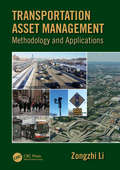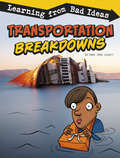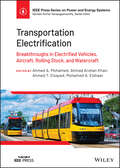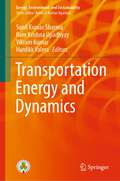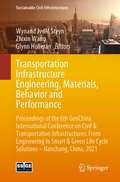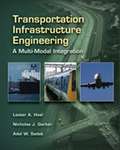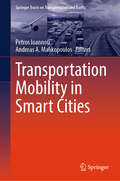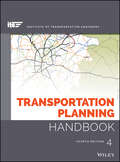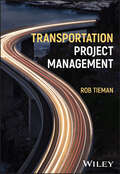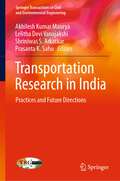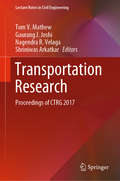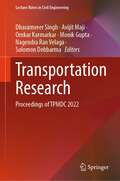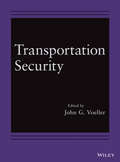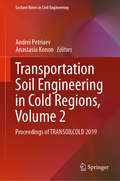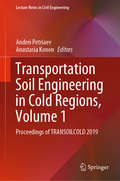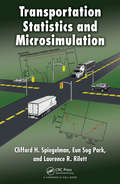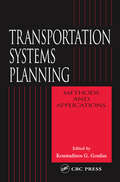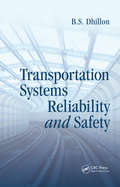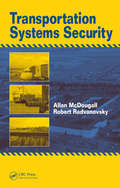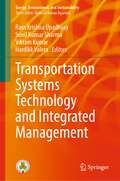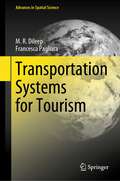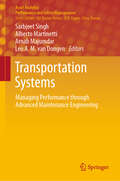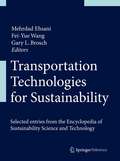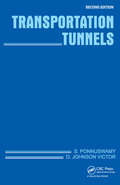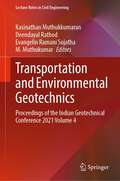- Table View
- List View
Transportation Asset Management: Methodology and Applications
by Zongzhi LiTransportation asset management delivers efficient and cost-effective investment decisions to support transportation infrastructure and system usage performance measured in economic, social, health, and environmental terms. It can be applied at national, state, and local levels. This distinctive book addresses asset management for multimodal transportation, taking account of system component interdependency, integration, and risk and uncertainty. It sets out rigorous quantitative and qualitative methods for addressing system goals, performance measures, and needs; data collection and management; performance modeling; project evaluation, selection, and trade-off analysis; innovative financing; and institutional issues. It applies as easily to static traffic and time-dependent or dynamic traffic which exists on a more local level. It is written for transportation planners, engineers, and academia, as well as a growing number of graduate students taking transportation asset management courses.
Transportation Breakdowns: Learning from Bad Ideas (Fantastic Fails)
by Amie Jane LeavittSee some of the world's fastest transportation breakdowns at lightning speed. Find out how each form of transportation failed, the basic engineering missed during construction, and what engineers learned from their mistakes.
Transportation Electrification: Breakthroughs in Electrified Vehicles, Aircraft, Rolling Stock, and Watercraft (IEEE Press Series on Power and Energy Systems)
by Ahmed A. Mohamed Ahmad Arshan Khan Ahmed T. Elsayed Mohamed A. ElshaerTransportation Electrification Dive deep into the latest breakthroughs in electrified modes of transport In Transportation Electrification, an accomplished team of researchers and industry experts delivers a unique synthesis of detailed analyses of recent breakthroughs in several modes of electric transportation and a holistic overview of how those advances can or cannot be applied to other modes of transportation. The editors include resources that examine electric aircraft, rolling stock, watercraft, and vehicle transportation types and comparatively determine their stages of development, distinctive and common barriers to advancement, challenges, gaps in technology, and possible solutions to developmental problems. This book offers readers a breadth of foundational knowledge combined with a deep understanding of the issues afflicting each mode of transportation. It acts as a roadmap and policy framework for transportation companies to guide the electrification of transportation vessels. Readers will benefit from an overview of key standards and regulations in the electrified transportation industry, as well as: A thorough introduction to the various modes of electric transportation, including recent advances in each mode, and the technological and policy challenges posed by them An exploration of different vehicle systems, including recent advanced in hybrid and EV powertrain architectures and advanced energy management strategies Discussions of electrified aircraft, including advanced technologies and architecture optimizations for cargo air vehicle, passenger air vehicles, and heavy lift vertical take-off and landing craft In-depth examinations of rolling stock and watercraft-type vehicles, and special vehicles, including various system architectures and energy storage systems relevant to each Perfect for practicing professionals in the electric transport industry, Transportation Electrification is also a must-read resource for standardization body members, regulators, officials, policy makers, and undergraduate students in electrical and electronics engineering.
Transportation Energy and Dynamics (Energy, Environment, and Sustainability)
by Vikram Kumar Hardikk Valera Ram Krishna Upadhyay Sunil Kumar SharmaThis book provides a macro-level understanding of transportation as an industry, through the lens of all the stakeholders that make up the ecosystem. It aids understanding about the transportation ecosystem, its components, challenges, contribution to economic growth, and the interplay between the stakeholders that govern the system. The contents also examine the background and history of transportation, emphasizing the fundamental role and importance the industry plays in companies, society, and the environment in which transportation service is provided. The book also provides an overview of carrier operations, management, technology, and the strategic principles for the successful management of different modes of transportation. This book is of interest to those working in academia, industry, and policy in the areas of transportation.
Transportation Infrastructure Engineering, Materials, Behavior and Performance: Proceedings of the 6th GeoChina International Conference on Civil & Transportation Infrastructures: From Engineering to Smart & Green Life Cycle Solutions -- Nanchang, China, 2021 (Sustainable Civil Infrastructures)
by Wynand JvdM Steyn Zhixin Wang Glynn HolleranSociety needs to travel to engage in productive and effective commerce, social, educational and related activities. Efficient travel is founded on an operational transport infrastructure system that is well-designed, engineering, constructed and maintained. This volume shares some of the latest innovations and thoughts in the areas of pavement infrastructure materials, behavior and performance. Access to this volume should enable the reader to gain an understanding of such novel information that should support improvements in the provision of an effective road transportation system for the benefit of the greater society served by the road network. The content is based on the contributions to the 6th GeoChina International Conference on Civil & Transportation Infrastructures: From Engineering to Smart & Green Life Cycle Solutions -- Nanchang, China, 2021.
Transportation Infrastructure Engineering: A Multimodal Integration
by Nicholas J. Garber Lester A. Hoel Adel W. Sadekransportation Infrastructure Engineering: A Multimodal Integration, intended to serve as a resource for courses in transportation engineering, emphasizes transportation in an overall systems perspective. It can serve as a textbook for an introductory course or for upper-level undergraduate and first-year graduate courses. This book, unlike the widely used textbook, Traffic and Highway Engineering, serves a different purpose and is intended for a broader audience. Its objective is to provide an overview of transportation from a multi-modal viewpoint rather than emphasizing a particular mode in great detail. By placing emphasis on explaining the environment in which transportation operates, this book presents the ""big picture"" to assist students in understanding why transportation systems operate as they do and the role they play in a global society.
Transportation Mobility in Smart Cities (Springer Tracts on Transportation and Traffic #21)
by Petros Ioannou Andreas A. MalikopoulosThis book covers multiple dimensions of future mobility systems in smart cities, mapping out the innovations that are needed, presenting ideas on how to address the challenges they present and exploring a holistic research path for future developments. The book considers the interaction between: technological developments in modes of transport and transportation systems like autonomous systems and shared mobility that lead to emerging mobility systems; the social behavior of the drivers and travelers who interact with these systems; and the institutional behavior of organized units such as the administrators responsible for the policies involved with transportation governance and regulation. Transportation Mobility in Smart Cities provides methods to analyze, design, and optimize a mobility system, taking into consideration this constellation of social and institutional factors as well as the necessary technological requirements. The result is a mobility system that will be acceptable to travelers without imposing undue inequities in transportation on the smart city. The holistic approach taken in addressing the problems involved with establishing a mobility system within a smart city makes this book attractive to researchers and practitioners, technologists, and policy makers alike. Graduate students working in areas connected with the evolution of transportation systems will also find the material presented in this book instructive.
Transportation Planning Handbook
by ITE Michael D. MeyerA multi-disciplinary approach to transportation planning fundamentals The Transportation Planning Handbook is a comprehensive, practice-oriented reference that presents the fundamental concepts of transportation planning alongside proven techniques. This new fourth edition is more strongly focused on serving the needs of all users, the role of safety in the planning process, and transportation planning in the context of societal concerns, including the development of more sustainable transportation solutions. The content structure has been redesigned with a new format that promotes a more functionally driven multimodal approach to planning, design, and implementation, including guidance toward the latest tools and technology. The material has been updated to reflect the latest changes to major transportation resources such as the HCM, MUTCD, HSM, and more, including the most current ADA accessibility regulations. Transportation planning has historically followed the rational planning model of defining objectives, identifying problems, generating and evaluating alternatives, and developing plans. Planners are increasingly expected to adopt a more multi-disciplinary approach, especially in light of the rising importance of sustainability and environmental concerns. This book presents the fundamentals of transportation planning in a multidisciplinary context, giving readers a practical reference for day-to-day answers. Serve the needs of all users Incorporate safety into the planning process Examine the latest transportation planning software packages Get up to date on the latest standards, recommendations, and codes Developed by The Institute of Transportation Engineers, this book is the culmination of over seventy years of transportation planning solutions, fully updated to reflect the needs of a changing society. For a comprehensive guide with practical answers, The Transportation Planning Handbook is an essential reference.
Transportation Project Management
by Rob TiemanApproachable guide combining project management principles and proven best practices applied to transportation projects Transportation Project Management is a comprehensive and approachable work providing practical guidance on all aspects of managing transportation projects. It covers project management principles, practical applications, and proven best practices, all tailored specifically to the unique workflows of developing and designing transportation projects, from inception through to advertisement for construction. Detailed themes include technical competencies, industry constraints, organizational opportunities, and the range of soft skills necessary to be an effective leader in this role. This timely publication responds to recent trends in the industry, as transportation organizations become more project-centric in their strategic approach, to enable more efficient project and program delivery amidst increased spending on infrastructure. Some topics covered in Transportation Project Management include: The “Triple Constraint” of budget, scope, and schedule, and meaningful change management The transportation Project Development Process and its unique interdependencies, opportunities, and constraints Creating your project management plan, a living document providing guidance and clarification on how the project will be managed during development Organizational structures, establishing and understanding how your organization operates, including who makes what decisions Understanding the fundamental differences between projects, programs, and portfolios, enabling successful project management within any organizational structure Critical Project Management soft skills, including communication, time management, leading meetings, stakeholder engagement, influence management, and managing expectations Developing and leading focused, efficient, and effective project teams Partnering with consultants to manage risks, drive development, and increase qualityAimed at professional transportation project managers in both the public and private sectors, along with engineering undergraduate and graduate students in related programs of study, Transportation Project Management provides the foundations for practitioners to become great transportation project managers.
Transportation Research in India: Practices and Future Directions
by Shriniwas S. Arkatkar Akhilesh Kumar Maurya Lelitha Devi Vanajakshi Prasanta K. SahuThis co-edited book focuses on the state-of-the-art research in transportation in India. Exploring the need for a sustainable transport paradigm in India, this timely book offers solution concepts for mobility and infrastructure challenges faced by local, state, and national transport authorities. The contents provide a holistic understanding of the paradigm, considering several case-studies and study findings from the leading transportation researchers in India. At the same time, it also addresses the pressing transportation related challenges such as road user safety, traffic operation efficiency, economic and social development, non-motorized transport planning, environmental impact mitigation, energy consumption reduction, land-use, equity, freight transport planning, multimodal coordination, access for the diverse range of travellers’ needs, sustainable pavement construction, and emerging vehicle technologies. The existing practices and policies in all the sectors and levels of transport are highlighted in this book with an emphasis on a broader vision for achieving sustainable and inclusive development. The information and data-driven inferences compiled in the book will be useful for practitioners, policymakers, educators, researchers, students, and individual learners.
Transportation Research: Proceedings of CTRG 2017 (Lecture Notes in Civil Engineering #45)
by Tom V. Mathew Gaurang J. Joshi Nagendra R. Velaga Shriniwas ArkatkarThis book presents selected papers from the 4th Conference of the Transportation Research Group of India. It provides a comprehensive analysis of themes spanning the field of transportation encompassing economics, financial management, social equity, green technologies, operations research, big data analysis, econometrics and structural mechanics. This volume will be of interest to researchers, educators, practitioners, managers, and policy-makers world-wide.
Transportation Research: Proceedings of TPMDC 2022 (Lecture Notes in Civil Engineering #434)
by Dharamveer Singh Avijit Maji Omkar Karmarkar Monik Gupta Nagendra Rao Velaga Solomon DebbarmaThis book is a collection of selected research papers from the 14th conference of the Transportation Planning and Implementation Methodologies for Developing Countries (TPMDC). It covers the broad area of transportation planning and policy, pavement design and engineering, emerging technologies in transportation, traffic management, operations, and safety, and sustainable mobility in transportation. The book aims to provide deeper understanding of the transportation issues, solutions, and learnings from the implemented solutions. This book will be of best interest for academicians, researchers, policy makers, and practitioners.
Transportation Security
by John G. VoellerTransportation Security features articles from the Wiley Handbook of Science and Technology for Homeland Security covering topics related to security challenge of transportation systems in the USA and elsewhere, performance measures, including coverage of critical supply chain protection and emergency evacuation.
Transportation Soil Engineering in Cold Regions, Volume 2: Proceedings of TRANSOILCOLD 2019 (Lecture Notes in Civil Engineering #50)
by Andrei Petriaev Anastasia KononThis volume comprises select papers presented during TRANSOILCOLD 2019. It covers the challenges and problems faced by engineers, designers, contractors, and infrastructure owners during planning and building of transport infrastructure in Arctic and cold regions. The contents of this book will be of use to researchers and professional engineers alike.
Transportation Soil Engineering in Cold Regions, Volume 1: Proceedings of TRANSOILCOLD 2019 (Lecture Notes in Civil Engineering #49)
by Andrei Petriaev Anastasia KononThis volume comprises select papers presented during TRANSOILCOLD 2019. It covers the challenges and problems faced by engineers, designers, contractors, and infrastructure owners during planning and building of transport infrastructure in Arctic and cold regions. The contents of this book will be of use to researchers and professional engineers alike.
Transportation Statistics and Microsimulation
by Clifford Spiegelman Eun Sug Park Laurence R. RilettBy discussing statistical concepts in the context of transportation planning and operations, Transportation Statistics and Microsimulation provides the necessary background for making informed transportation-related decisions. It explains the why behind standard methods and uses real-world transportation examples and problems to illustrate key conc
Transportation Systems Planning: Methods and Applications (New Directions in Civil Engineering)
by Konstadinos G. GouliasTransportation engineering and transportation planning are two sides of the same coin aiming at the design of an efficient infrastructure and service to meet the growing needs for accessibility and mobility. Many well-designed transport systems that meet these needs are based on a solid understanding of human behavior. Since transportation systems
Transportation Systems Reliability and Safety
by B.S. DhillonDuring day-to-day use, thousands of lives are lost each year due to accidents, directly or indirectly, resulting from poor transportation system reliability and safety. In the United States, automobile accidents alone result in around 42,000 deaths per year, costing billions of dollars to the economy each year. A common subject in journal articles
Transportation Systems Security
by Allan McDougall Robert RadvanovskyHighlighting the importance of transportation to a country‘s infrastructure and survival, Transportation Systems Security presents the strategic and practical considerations involved in the implementation of physical, procedural, and managerial safeguards required to keep all modes of transportation up and running during an actual or potenti
Transportation Systems Technology and Integrated Management (Energy, Environment, and Sustainability)
by Vikram Kumar Hardikk Valera Ram Krishna Upadhyay Sunil Kumar SharmaThe book highlights the transportation ecosystems and its management with underlying technologies for futuristic freight and passenger movement. The contents include contributions on climate change impact on transportation infrastructure, enhancing multimodal transportation, solar energy in railways, managing public transportation with technology, among others. It also includes chapters of newly developed technologies for the intelligent transport system. This book is a useful guide to those working in academia and industry in transportation technology.
Transportation Systems for Tourism (Advances in Spatial Science)
by Francesca Pagliara M. R. DileepThis textbook provides a comprehensive learning resource material for tourism transportation. Exploring the interrelationship between transport and tourism, it demonstrates how different types of transportation systems interact and are combined within the tourism destination framework. It addresses topics such as the geographical aspects of tourism transportation, technological advances in transportation, public transportation in tourism, drive tourism, recreational transportation, and various forms of tourism, including car, rail, coach, water, cycling, and space tourism. Readers will also learn about sustainability aspects, consumer behavior, and tourist behavior modelling. The book offers a valuable asset for graduate as well as master degree students in regional and spatial science, transportation engineering, and tourism and transportation economics, as well as for professionals in the travel, tourism, transport, and hospitality industries who are interested in the link between tourism and transportation, its benefits and impacts. Tourist destinations can strategically use this learning resource to gain a better understanding of the leisure and recreational aspects of the transportation system and consequently boost their appeal to tourists.
Transportation Systems: Managing Performance through Advanced Maintenance Engineering (Asset Analytics)
by Sarbjeet Singh Alberto Martinetti Arnab Majumdar Leo A. M. van DongenThis book explores the application of breakthrough technologies to improve transportation performance. Transportation systems represent the “blood vessels” of a society, in which people and goods travel. They also influence people’s lives and affect the liveability and sustainability of our cities. The book shows how emergent technologies are able to monitor the condition of the structure in real time in order to schedule the right moment for maintenance activities an so reduce the disturbance to users.This book is a valuable resource for those involved in research and development in this field. Part I discusses the context of transportation systems, highlighting the major issues and challenges, the importance of understating human factors that could affect the maintenance operations and the main goals in terms of safety standards. Part II focuses on process-oriented innovations in transportation systems; this section stresses the importance of including design parameters in the planning, offering a comparison between risk-based and condition-based maintenance and, lastly, showing applications of emergent technologies. Part III goes on to reflect on the technical-oriented innovations, discussing the importance of studying the physical phenomena that are behind transportation system failures and problems. It then introduces the general trend of collecting and analyzing big data using real-world cases to evaluate the positive and negative aspects of adopting extensive smart sensors for gathering information on the health of the assets. The last part (IV) explores cultural and behavioural changes, and new knowledge management methods, proposing novel forms of maintenance and vocational training, and introduces the need for radical new visions in transportation for managing unexpected events.The continuous evolution of maintenance fields suggests that this compendium of “state-of-the-art” applications will not be the only one; the authors are planning a collection of cutting-edge examples of transportation systems that can assist researchers and practitioners as well as students in the process of understanding the complex and multidisciplinary environment of maintenance engineering applied to the transport sector.
Transportation Technologies for Sustainability
by Fei-Yue Wang Gary L. Brosch Mehrdad EhsaniInnovative transportation technologies will be a vital component of any future sustainable society. Gathering over 50 authoritative, peer-reviewed entries from the Encyclopedia of Sustainability Science and Technology, Transportation Technologies for Sustainability covers a broad range of transportation-related sustainability research, from vehicle design and technology to mass transit systems. State-of-the-art chapters describe key developments in intelligent vehicle technology, including vision sensors, driver status monitoring, and vehicle motion control, while international experts present the latest research in electric, hybrid, and fuel cell vehicles. Leaders in the mass transit field assess a broad spectrum of alternatives in both small and large urban areas. This valuable collection is an essential reference for undergraduate and graduate students, researchers, policymakers, and industry experts.
Transportation Tunnels
by S. Ponnuswamy D. Johnson VictorTransportation Tunnels, 2nd Edition provides a comprehensive text on tunneling and tunnel engineering applicable in general to all types of tunnels, with more detailed information on highway and railway tunnels. While the First Edition of the book was confined to deal with railway and highway tunnels, the Second Edition is also extensively considering the latest trends in use of tunnels in different other fields. The book has been revised to provide coverage of water conveyance, navigation and material conveyance tunnels also and deals with these subjects in more detail. It covers all aspects of investigation, design, construction, monitoring and maintenance of tunnels. Special emphasis has been laid on the geotechnical investigations, interpretation of findings and relating the same to the design as well as the construction of tunnels. The book reflects the advancements in the knowledge of ground behaviour and rock mechanics and also in construction technology, including use of TBM in the last two decades.It covers in sufficient detail the basic requirements of tunnel profile, the geometric parameters, clearance requirements, aerodynamics, and cost economics in fixing alignments with different design parameters like curvature, gradient and operational requirements. It discusses in detail alternative forms of the cross section / profile and illustrates design methodology with examples.The different methodologies that have been used in the past using timber or steel supports by stage wise expansion of cross sections and modern methodologies used for boring full profile using new tunneling methods and Tunnel Boring Machines are also comprehensively discussed. Requirements of tunnels in respect of ventilation, lighting and drainage are adequately covered. Separate chapters have been included on ‘Instrumentation’ and ‘Tunnel Inspection and Maintenance’.The expanded text on the use and advantages of methodologies and equipment for dealing with various aspects of construction of tunnels is based on observations through site visits, discussions with, and experiences of people as recorded on large number of tunneling works which have been taken up recently for railways, highways and urban transport subway projects. The book can serve as a textbook for undergraduate and graduate students and as a reference book for practicing engineers.
Transportation and Environmental Geotechnics: Proceedings of the Indian Geotechnical Conference 2021 Volume 4 (Lecture Notes in Civil Engineering #298)
by M. Muthukumar Kasinathan Muthukkumaran Deendayal Rathod Evangelin Ramani SujathaThis book comprises the select peer-reviewed proceedings of the Indian Geotechnical Conference (IGC) 2021. The contents focus on Geotechnics for Infrastructure Development and Innovative Applications. This book covers topics related application of natural and artificial geosynthetics in shallow foundation bearing capacity enhancement, highway & railway pavements, high speed rail and geo-environmental applications. Topics also covered related to simulation of geosynthetic encased stone column, application of geosynthetic for ground improvement, pore size distribution of compacted expansive soils, MICP, landfills, among others. This book is of interest to those in academia and industry.
